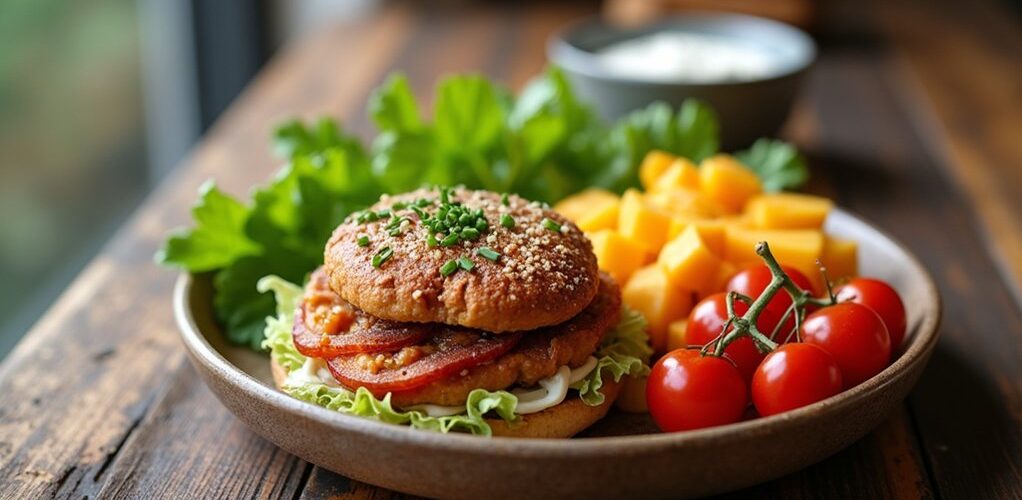
High-fat, low-carb foods include dairy selections like grass-fed butter, heavy cream, and cheese varieties containing minimal carbohydrates. Nutrient-dense options feature almonds, walnuts, and pumpkin seeds, while heart-healthy oils encompass olive oil, avocado oil, and coconut oil rich in MCTs. Natural protein sources such as salmon, eggs, and fatty fish provide essential omega-3s. Quality animal fats and plant-based options offer diverse ways to maintain ketosis while supporting overall health. Understanding proper food combinations reveals maximum nutritional benefits.
Key Takeaways
- Dairy products like grass-fed butter, heavy cream, and cheese provide substantial healthy fats while keeping carbohydrates minimal.
- Nuts and seeds, including almonds, walnuts, and pumpkin seeds, offer healthy fats and protein with only 1-2g carbs per serving.
- Natural oils such as olive oil, coconut oil, and avocado oil contain zero carbs while delivering essential healthy fats.
- Fatty fish like salmon and tuna provide excellent protein and omega-3 fatty acids with virtually no carbohydrates.
- Avocados deliver 14.75g of healthy fats per 100g serving with only 1.83g carbs and abundant nutrients.
Essential High-Fat Dairy Selections
Several essential high-fat dairy products serve as cornerstone ingredients for those following a low-carb lifestyle, offering rich nutritional profiles while keeping carbohydrate content minimal.
Grass-fed butter provides substantial healthy fats with negligible carbs, while cheese varieties like cheddar, feta, and goat cheese deliver both protein and fats with minimal carbohydrates.
Quality dairy products like grass-fed butter and nutrient-dense cheeses offer essential fats and proteins while keeping carbohydrates remarkably low.
Heavy cream stands out as an excellent high-fat option, containing over 50g of fat per 100g serving, making it perfect for enriching various dishes.
Plain Greek yogurt offers around 3-4g net carbs per serving, making it a suitable choice for those needing a protein-packed, low-carb option.
For those seeking versatility, unsweetened full-fat yogurt and cottage cheese offer beneficial combinations of fats and protein while maintaining relatively low carb counts.
These dairy selections provide satisfying options for maintaining a high-fat, low-carb dietary approach while ensuring adequate nutrition.
Nutrient-Dense Nuts and Seeds Options
Various nutrient-dense nuts and seeds emerge as cornerstone ingredients for those following a high-fat, low-carb eating pattern. Research links their regular consumption to lower mortality rates and improved heart health, making them essential additions to a balanced diet. These healthy fats sources offer versatility in preparation and consumption, from raw snacking to incorporation in recipes. Natural nut butters, when made without added sugars, provide concentrated nutrients while maintaining the low-carb profile essential for specialized dietary needs. Among the best options, almonds and chia seeds provide not only protein but also healthy fats and fiber, making them excellent choices for those on a keto diet.
| Food Item | Fat Content (per 100g) | Carb Content (per 100g) | Key Benefits |
|---|---|---|---|
| Almonds | 16.7g | 2.1g | Heart health |
| Walnuts | 20.6g | 1.0g | Anti-inflammatory |
| Pumpkin Seeds | 4.6g | 1.5g | Rich in magnesium |
| Natural Peanut Butter | 15.0g | 3.5g | Protein-rich |
| Mixed Nuts | 15.5g | 2.0g | Nutrient variety |
Heart-Healthy Oils and Fats
The selection of healthy fats and oils plays a central role in supporting cardiovascular health while maintaining a low-carb lifestyle. Heart-healthy oils like olive and avocado oil contain beneficial monounsaturated fats that improve cholesterol levels and reduce heart disease risk. Coconut oil, rich in medium-chain triglycerides, provides quick energy for those following a low-carb diet, while ghee and grass-fed butter offer saturated fats with anti-inflammatory properties. Incorporating nuts, particularly walnuts and almonds, adds essential nutrients and healthy fats to the diet. Fatty fish provide vital omega-3 fatty acids that enhance cardiovascular health and insulin sensitivity. Selecting oils with high smoke points allows for versatile cooking without losing nutritional value. These diverse sources of healthy fats create a foundation for sustainable low-carb eating while supporting overall wellness through their varied nutritional profiles.
Natural Protein Sources With High Fat Content
Natural protein sources rich in healthy fats form the cornerstone of successful low-carb dietary approaches. For those following a ketogenic diet or low-carb lifestyle, several nutritious options provide both essential proteins and healthy fats while keeping carbohydrates minimal.
- Salmon stands out as a premium choice, delivering 26g of protein and 11.8g of fat per 100g serving, making it ideal for high-fat meal planning.
- Eggs and cheese offer versatile protein sources, with eggs containing 14.1g of protein per 100g and cheddar cheese providing a substantial 25.4g of protein and 34.9g of fat.
- Pork rinds serve as a convenient zero-carb snack option with 17.4g of protein per serving, while lean chicken can be transformed into a high-fat meal when paired with healthy fats.
- It's important to distribute protein intake evenly across meals, aiming for 15-25 grams per meal, to optimize muscle synthesis and maintain ketosis.
Low Carb Vegetables Rich in Healthy Fats
Among low-carb vegetables, avocados stand out as nature's perfect high-fat option, containing an impressive 14.75 grams of healthy fats per 100 grams while maintaining minimal carbohydrate content. Olives complement the keto-friendly vegetable category, offering 11-15 grams of beneficial fats per 100 grams through their rich concentration of heart-healthy oleic acid. These two powerhouse foods serve as foundational ingredients for those seeking to maintain ketosis while enjoying natural, whole-food sources of dietary fat. For those following a ketogenic diet, keto-friendly sweeteners like stevia and erythritol can enhance recipes without disrupting ketosis.
Avocados Pack Healthy Fats
Packed with heart-healthy fats and essential nutrients, avocados stand out as an exceptional choice for those following a low-carb lifestyle.
These versatile fruits contain an impressive nutritional profile, with monounsaturated fats comprising over 60% of their fat content, directly supporting heart health and helping maintain healthy cholesterol levels.
Key benefits of incorporating avocados into a low-carb diet include:
- High fiber content promoting satiety and digestive health
- Minimal net carbohydrates at just 1.83g per 100g serving
- Rich source of essential nutrients including potassium, calcium, and B vitamins
The combination of healthy fats and fiber makes avocados particularly filling, while their creamy texture and mild flavor enhance various dishes without compromising dietary goals.
Their nutrient density and low carbohydrate content make them an ideal foundation for maintaining a sustainable low-carb eating plan.
Olives For Keto Success
Mediterranean olives emerge as a nutritional powerhouse for those following a ketogenic lifestyle, offering an ideal combination of healthy fats and minimal carbohydrates. With just 1.5g of net carbs per 100g, these low carb gems fit perfectly into a keto diet while delivering substantial monounsaturated fats that promote heart health and satiety.
Rich in antioxidants, particularly vitamin E and polyphenols, olives provide protection against inflammation and oxidative stress. Their high concentration of oleic acid contributes to improved cholesterol levels and cardiovascular function.
As a nutrient-dense snack, olives offer versatility in meal planning, enhancing dishes with their distinctive flavor while maintaining strict carbohydrate limits. Their natural high fat content makes them an excellent choice for maintaining ketosis while supporting overall wellness through their diverse nutritional profile.
Seafood Choices for LCHF Diets
Seafood provides exceptional options for those following a low-carb, high-fat eating pattern, with fatty fish like salmon and mackerel leading the way in omega-3 content and ideal fat-to-protein ratios. Various preparation methods, including grilling, baking, or pan-searing with healthy fats, can enhance both the nutritional value and taste of seafood while maintaining its low-carb status. From protein-rich shellfish to nutrient-dense anchovies and versatile tuna, these maritime options offer practical solutions for creating satisfying LCHF meals while delivering essential micronutrients like vitamin D and selenium. Additionally, fat adaptation enhances energy utilization during long runs, making seafood a beneficial component of an athlete's diet on a low-carb regimen.
Fatty Fish Benefits
When choosing nutrient-dense foods for a low-carb, high-fat diet, fatty fish emerge as exceptional options that deliver powerful health benefits. Rich in omega-3 fatty acids, these fish support cardiovascular health by reducing inflammation and improving insulin sensitivity.
A typical serving of fatty fish provides substantial protein and healthy fats while containing zero carbohydrates, making them ideal for low-carb meal plans.
- Salmon, tuna, and sardines offer approximately 26g of protein and 11.8g of fat per 100g serving
- Regular consumption helps regulate cholesterol levels and promotes fat loss
- Studies indicate that fatty fish consumption can lower blood pressure and support weight loss goals
These versatile ingredients can be prepared through various cooking methods, allowing for creative incorporation into LCHF meal plans while maintaining their nutritional benefits.
Shellfish Nutrition Guide
Although many focus primarily on fatty fish in low-carb diets, shellfish represent an equally valuable category of seafood choices for those following LCHF eating plans.
Shrimp and crab stand out as particularly nutritious options, offering impressive protein content while maintaining minimal carbohydrates. A 100g serving of shrimp delivers 24g of protein with virtually no carbs, while crab provides 19g of protein per serving.
Beyond their protein content, shellfish are rich in essential micronutrients, including zinc, selenium, and vitamin B12, making them excellent additions to high-fat, low carbohydrate meal plans.
For ideal nutrition and reduced exposure to contaminants, selecting wild-caught varieties is recommended. These seafood choices provide versatile options for those seeking to maintain ketogenic or LCHF dietary approaches while ensuring adequate nutrient intake.
Best Preparation Methods
Mastering the preparation of seafood is essential for maximizing both nutritional benefits and flavor in a low-carb, high-fat eating plan. Following LCHF principles, several cooking methods can enhance the natural omega-3 fatty acids while maintaining low carb content.
- Baking or grilling fish like salmon and tuna helps retain moisture while allowing healthy fats from olive oil or butter to be absorbed.
- Seasoning with spices, herbs, and lemon juice adds complexity without introducing carbohydrates.
- Pairing seafood with non-starchy vegetables creates complete meals that align with low-carb goals.
The key to successful seafood preparation lies in combining proper cooking techniques with complementary ingredients.
Whether pan-searing sardines or baking cod, incorporating healthy fats during cooking guarantees dishes remain satisfying while supporting the body's nutritional needs on an LCHF diet.
Smart Snacking on High-Fat Foods
Successful snacking on a high-fat, low-carb diet requires careful selection of nutrient-dense foods that satisfy hunger while maintaining dietary goals. For those following ketogenic or low-carb lifestyles, several options provide ideal nutrition while keeping carbohydrates in check.
| Snack Option | Fat Content | Benefits |
|---|---|---|
| Nuts & Butters | 15.3g/oz | Rich in vitamin E, magnesium |
| Pork Rinds | 8.87g/oz | High protein, zero carbs |
| Dark Chocolate | 12.1g/oz | Contains antioxidants |
These snacks, along with cheese varieties and avocados, offer versatile options for maintaining healthy fat intake throughout the day. Cheese provides substantial fat content while staying low in carbohydrates, while avocados deliver essential nutrients and monounsaturated fats. Each option contributes to satiety and supports adherence to a low-carb eating plan. Including healthy alternatives like zucchini chips and parmesan cheese crisps can add variety and maintain interest in your keto journey.
Beneficial Fats From Plant Sources
Plant-based sources of healthy fats provide essential nutrition while maintaining the low-carb requirements of ketogenic and carb-restricted diets. Several plant-derived options offer high-quality fats while keeping carbohydrates minimal.
Avocados deliver healthy fats and minimal carbs, while nuts and seeds provide concentrated sources of omega-3 fatty acids and monounsaturated fats.
Key plant-based sources of beneficial fats include:
- Olive oil, containing primarily monounsaturated fats and virtually no carbohydrates
- Coconut oil, rich in medium-chain triglycerides (MCTs) and zero carbs
- Flax seeds and walnuts, high in fat and omega-3 fatty acids
Avocados are particularly rich in potassium, a vital nutrient that supports heart health and overall well-being.
These plant sources not only support dietary fat requirements but also contribute to overall health through their unique nutritional profiles.
Each option provides distinct benefits while maintaining the essential high-fat, low-carbohydrate balance necessary for restricted-carb eating plans.
Quality Animal Fats and Their Uses
While plant-based fats offer numerous benefits, animal-derived fats present their own unique advantages in low-carb eating plans.
Quality animal fats, such as grass-fed butter, provide substantial fat content with minimal carbohydrates, making them ideal for low-carb diets. Ghee, a form of clarified butter, offers both fat-soluble vitamins and a high smoke point, while tallow brings rich monounsaturated fats ideal for savory cooking applications.
Animal-derived fats like grass-fed butter and ghee deliver essential nutrients while keeping carbs low, making them perfect for ketogenic cooking methods.
Lard presents a versatile option, containing both saturated fat and healthy unsaturated fats that can enhance taste in various dishes. These cooking options, including duck fat and bacon grease, serve as excellent healthy fat sources that not only improve flavor but also promote satiety.
Incorporating fats like MCT oil from coconut oil, which aids in weight loss and improves brain health, can further enhance the nutritional value of your meals. When incorporated thoughtfully into meals, these animal-derived fats can support nutritional goals while maintaining low carbohydrate intake.
Frequently Asked Questions
What Is High in Fat but Low in Carbs?
Foods high in fat yet low in carbs include avocados, coconut oil, various cheeses, nut butters, fatty fish, olive oil, dark chocolate, nutrient-rich seeds, full-fat dairy products, and bacon options.
What Are High-Fat, Low-Carb Snacks?
Popular high-fat, low-carb snacks include keto cheese, almond butter, pork rinds, coconut chips, dark chocolate, avocado slices, beef jerky, nuts drizzled with olive oil, and hard-boiled eggs.
What Foods Are High-Fat, Low-Carb, and Low Protein?
Foods high in fat but low in carbs and protein include coconut oil, olive oil, avocados, butter, ghee, and certain cheeses. These provide essential fats while maintaining minimal protein and carbohydrate content.
What's the Worst Carb for Belly Fat?
Refined sugars and processed white flour products rank as the worst carbs for belly fat, due to their high glycemic index, hidden sugars, and tendency to spike insulin levels, promoting abdominal fat storage.
Conclusion
Following a high-fat, low-carb eating pattern requires careful food selection and nutritional awareness. By incorporating dairy products, nuts, healthy oils, quality proteins, and fatty fish into daily meals, individuals can maintain ketosis while ensuring adequate nutrition. Understanding portion sizes and selecting nutrient-dense options helps optimize health benefits. With proper planning and food knowledge, a high-fat, low-carb lifestyle becomes sustainable and enjoyable for long-term success.
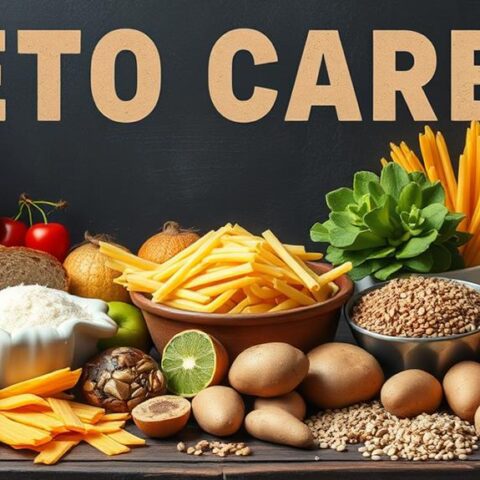
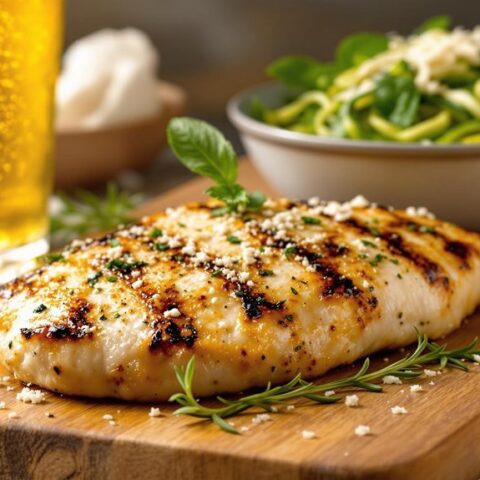
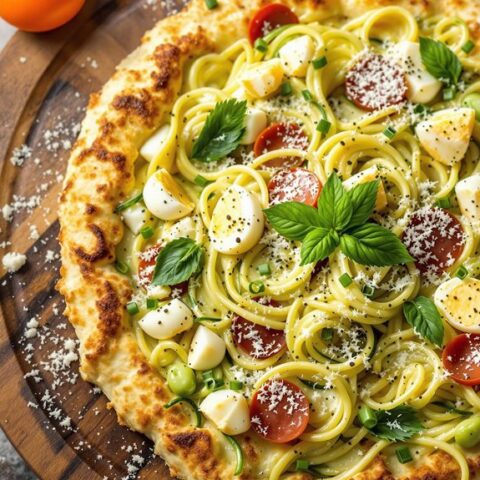
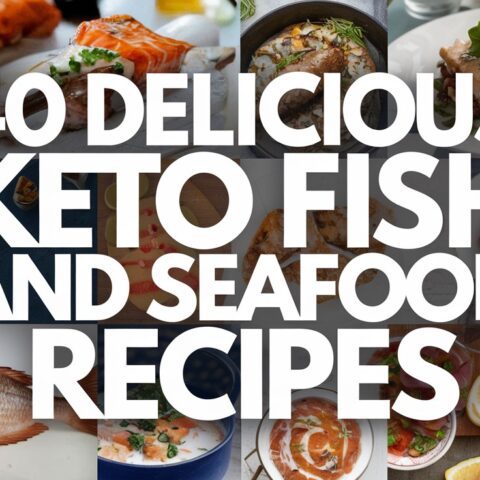
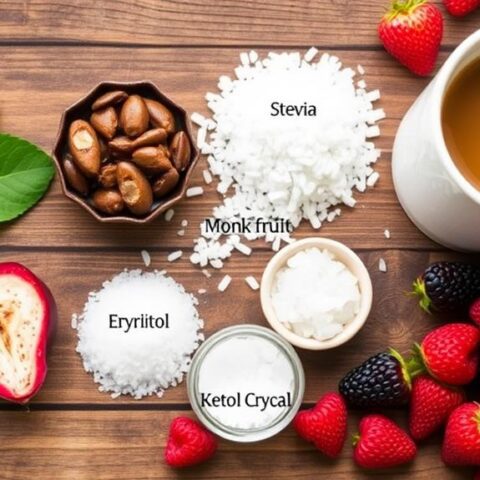
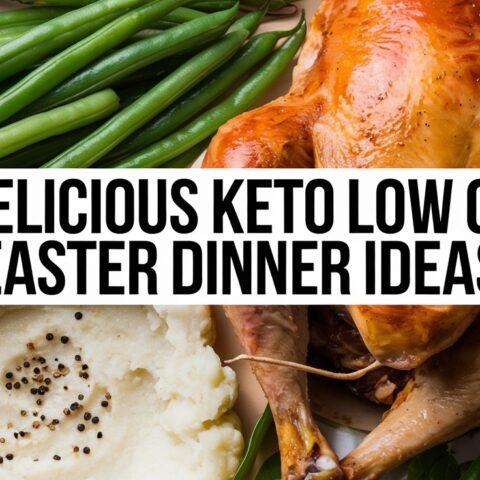




No Comments